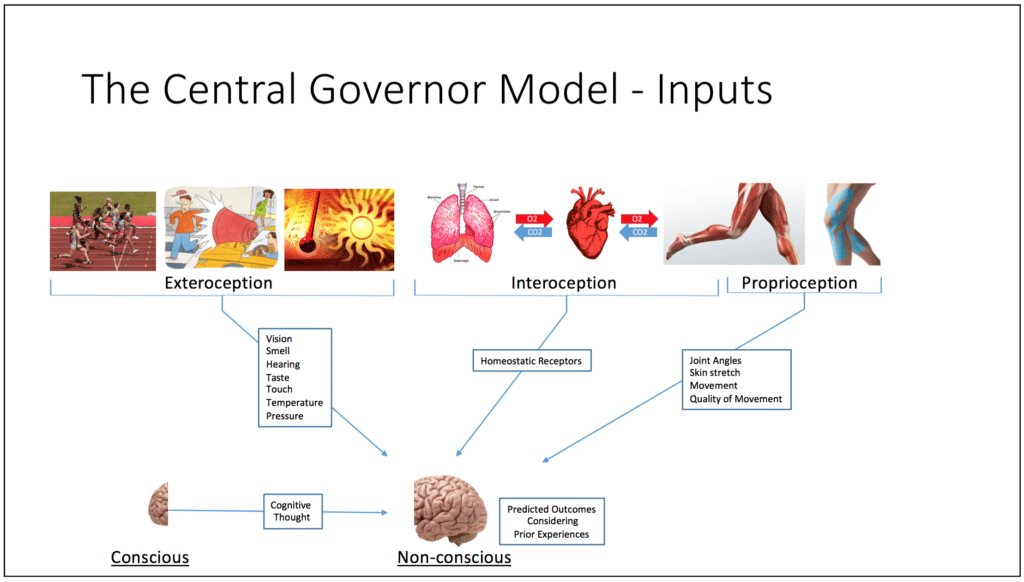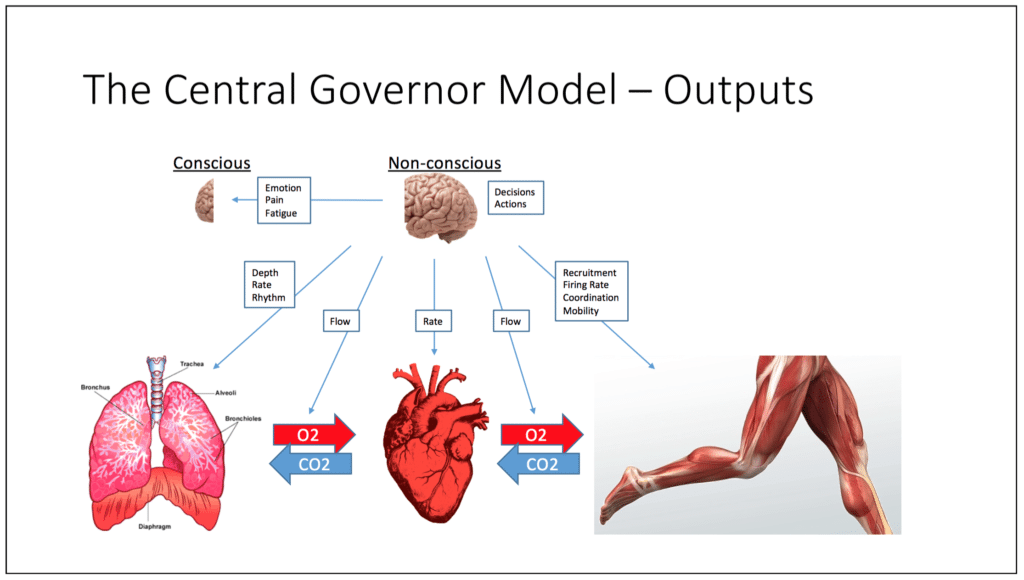Why do I have good days and bad days? Do I perform better when it’s hot or cold? Can I compete as well at night as during the day? Does my performance deteriorate when I’m dehydrated? Do I have more pain some days than others?
Your non-conscious brain receives millions of sensory signals a second. Additionally, it’s taking input from your conscious brain. What’s it doing with all that information? You might think it’s just storing some of it away and tossing the rest. Making memories, right? It’s certainly doing some of that. Its most important function is to keep us safe. It’s constantly evaluating all available information to do so.
Sensory Inputs
Your senses allow you to perceive the outside world, right? Right, but also your inside world and the position of your body in space. They tell your brain:
- What’s going on inside your body, like the state of your organs and blood chemistry
- What’s going on outside your body, like temperature, sound, smell, taste, touch, etc.
- Where your body is and how it’s moving through space, like the angle of a joint or the location of a body part
Physiological and Emotional Outputs
You’re surely aware that your heart rate, breathing rate, blood pressure, sweat and pupil size all change in response to stress, general or acute. This is what allows a polygraph to detect whether you are lying or not. You also likely know that extreme stress results in fight, flight or freeze responses.
What is less widely understood is that your brain is also constantly adjusting local blood flow, muscle firing rates, hormone release, strength, coordination, range of motion and sensory acuity. It’s triggering feelings or emotions, like pain, fatigue, anxiety, fear and elation in response to its interpretation of sensory inputs.
What Are You Thinking?
How does your brain evaluate the information it’s receiving so it can make the proper adjustments to outputs? Prior experience. Your brain is a predictive organ. If it has positive experiences that match your current circumstances, it’s likely to promote more of the current activity. If it has negative priors, it’s going to make corrections that reduce the activity. If you’ve never experienced anything like you are now, or haven’t in a long time, it’s likely to reduce that activity also. The familiar and positive is relaxing. Everything else is potentially stressful.
Additionally, your brain is keeping a running tally of stress, or maybe a better term is threat. In addition to evaluating your current activity, it’s evaluating everything else that’s going on in your life. If your boss is on your case, you fought with your spouse; you’re recovering from an injury, you sit too much, have over-trained or move badly, it all adds up and you are not likely to perform well. The activity you are currently engaged in may not be threatening to your brain, but the sum of other things in your life could be.
So What?
After having read all this, you could come to the conclusion – “Interesting, but I can’t do anything about it, so why should I care?”. In fact, that’s where most people land without understanding. There is a huge opportunity, though:
- While you can’t easily change how your brain’s responds to threat (outputs).
- And you can’t change your brain’s threat evaluation process
- You can increase your library of positive prior experience and reduce overall levels of threat.
- You certainly can change your sensory inputs, both what you are experiencing and how well you sense it (sensory acuity).
You are changing your sensory inputs every time you move or change your environment or body chemistry. The resulting physiological changes are nearly instantaneous. Not every sensory change is important enough for your brain to change threat levels and physiological outputs. NeuralTraining will help you explore changing sensory input, improve sensory acuity, accumulate beneficial experience to find what works best for you. You can also experiment for yourself to see if the following items (and much more) could make a difference:
- Different shoes or clothing?
- Different sunglasses?
- Belly breathing and breathing cadence?
- Improved mobility?
- Different warm-up routines?
The result will be reduced threat and better performance because you’ll be taking the brakes off of the fitness you’ve earned.



